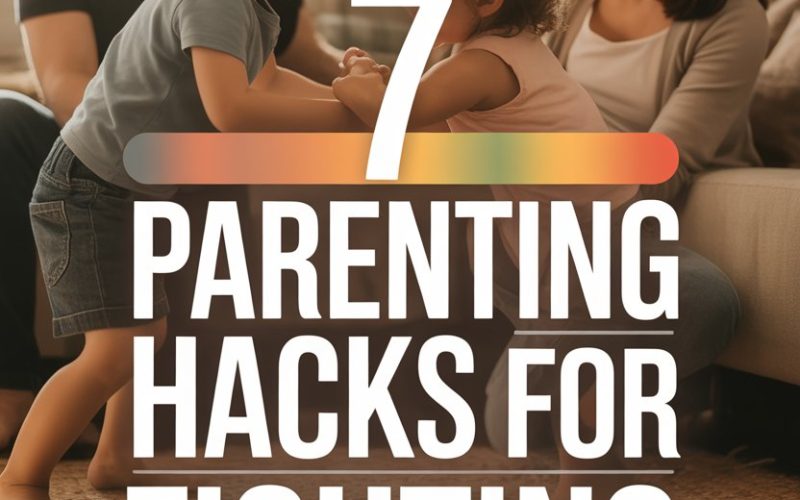Ah, siblings. Built-in best friends, lifelong rivals, and sometimes, the reason you have that bottle of Merlot stashed behind the pasta jars.
If your household sounds more like a WWF match than a loving family sitcom, you’re not alone. Even the calmest parents can be left wondering if their kids will ever stop squabbling long enough to agree on a TV show, never mind share a biscuit.
The good news? There are practical ways to keep the peace (or at least turn the volume down a notch).
Ready to help your kids get along—well, more often than not?
Here are seven tried-and-tested hacks to survive (and maybe even enjoy) the sibling circus.
1. Rethink “Fair” and Focus on “Need”
Any parent who’s tried to cut a cake exactly in half knows the perils of the “That’s not fair!” whinge. Children have a radar for injustice—mainly when it suits them.
The trick is to reframe “fairness.” Instead of aiming for identical treatment, try explaining the difference between fair and equal.
Sometimes, one child needs new shoes while the other doesn’t. Or one gets to choose what’s for tea because the other picked yesterday.
As parenting expert Dr. Laura Markham points out, treating kids’ needs individually gives them a sense of being seen, rather than fueling rivalry.
An age-appropriate script: “I give you what you need, not always what your brother needs. It might look different sometimes, and that’s okay.”
2. Model (Mostly) Calm Conflict Resolution
If you’re silently mouthing, “But I’m not calm!” at the screen, join the club. Parents aren’t robots, and sometimes you’ll lose your cool.
Kids, though, watch how we disagree—sometimes more than what we say.
Show them how to have a disagreement without shouting, name-calling, or sulking for three days. This means owning up when you snap (“I lost my temper. Next time I’ll try to use my calm voice.”) and repairing when needed.
Research from the University of Michigan highlights that children who witness healthy conflict resolution learn better social skills and have closer sibling bonds.
Don’t be afraid to narrate your process: “I’m feeling cross, so I need a minute to calm down before we talk.” Your kids might roll their eyes, but they’re listening.
3. Give Them Space—Literally and Emotionally
Sometimes, all the togetherness in the world can be a recipe for disaster. Even the happiest siblings need a break from each other (and, frankly, from us).
Set up physical spaces where each child can retreat, even if it’s just a favourite cushion in the lounge or a secret reading corner under the stairs.
During a squabble, offer the option: “Do you want to be together right now, or do you need some time apart?” This respects their need for solitude, cools tempers, and prevents drama from boiling over.
For emotional space, let your children vent safely. If your eldest is ranting about a sibling’s “annoying” habits, try listening without judgment or advice.
Sometimes, just being heard is enough to take the sting out of sibling spats.
4. Family Meetings: Not Just for Corporate Boardrooms
Stay with me—this doesn’t have to involve PowerPoint slides. A relaxed family meeting (snacks are a must) gives everyone a chance to air grievances and solve problems together.
Keep it light and short. Go around the table and ask, “What’s working well between you two?” and “What’s a problem we could fix together?”
Younger children might need prompts or even puppets to act out their feelings.
Research shows that families who hold regular meetings have children who are more cooperative and feel more empowered at home. Plus, it’s a chance to practice negotiation and compromise.
And if all else fails: bribe them with chocolate biscuits.
5. Don’t Play Referee—Coach Them Instead
It’s tempting to step in every time you hear, “He started it!” or “She won’t give it back!” But constantly playing judge and jury has its downsides.
Kids miss out on learning how to sort out their own squabbles.
Shift into coach mode. Instead of assigning blame, guide your children to express their feelings and figure out solutions. Try: “I see you’re both upset. What do you think would help fix this?”
You’ll probably get some outlandish suggestions at first (“Send her to Mars!”), but keep going. With practice, kids can get surprisingly good at compromise.
Sibling mediation can get a little noisy, but keep your sense of humour handy. And if the fight is genuinely dangerous—yes, then you intervene. Otherwise, resist the urge to whistle for half-time.
6. Special Time: One-on-One Moments Matter
Nothing breeds sibling rivalry quite like feeling overlooked. A bit of one-on-one time—ten minutes, no phones, just the two of you—works wonders for most squabbling siblings.
This doesn’t need to be a grand outing; reading a book together or sharing a hot chocolate after tea counts. The point is to fill up each child’s “attention tank” so they’re less likely to scrap over you.
Dr. Laura Markham’s advice on special time rituals is a goldmine if you need inspiration.
If you have more children than hands, rotate days or let them help choose what you do together. Even a little time goes a long way.
7. Encourage Teamwork (With a Dash of Healthy Competition)
Believe it or not, siblings can work together—yes, without a bribe.
Give them a reason to join forces, like a Lego-building contest against the grown-ups, or a “Who can clean up the playroom fastest?” challenge (winner gets to pick pudding).
Joint projects build bonds and create positive memories. Just beware: if you’re the competitive type, maybe don’t let on if you’re secretly trying to win the Lego contest.
When the day’s chaos winds down, recount moments they worked together (“I loved seeing you two help each other with puzzles today!”). Positive reinforcement is a classic for a reason—it helps kids see themselves as a team.
Sanity, One Day at a Time
At the end of the day, sibling rivalry isn’t a sign that you’ve failed as a parent. It’s a normal part of childhood, even if it sometimes feels like your very own reality TV show.
Progress is measured in baby steps (and sometimes, in deep breaths taken behind a locked loo door).
Try one or two of these hacks tonight and see what sticks. Some days you’ll be the Dalai Lama; others, you’ll be doing damage control with a pack of plasters.
Either way, you’re not alone.
And remember—one day, your kids might actually thank you for all those lessons in conflict resolution.
Or at the very least, they’ll argue about who gets to host Christmas.




